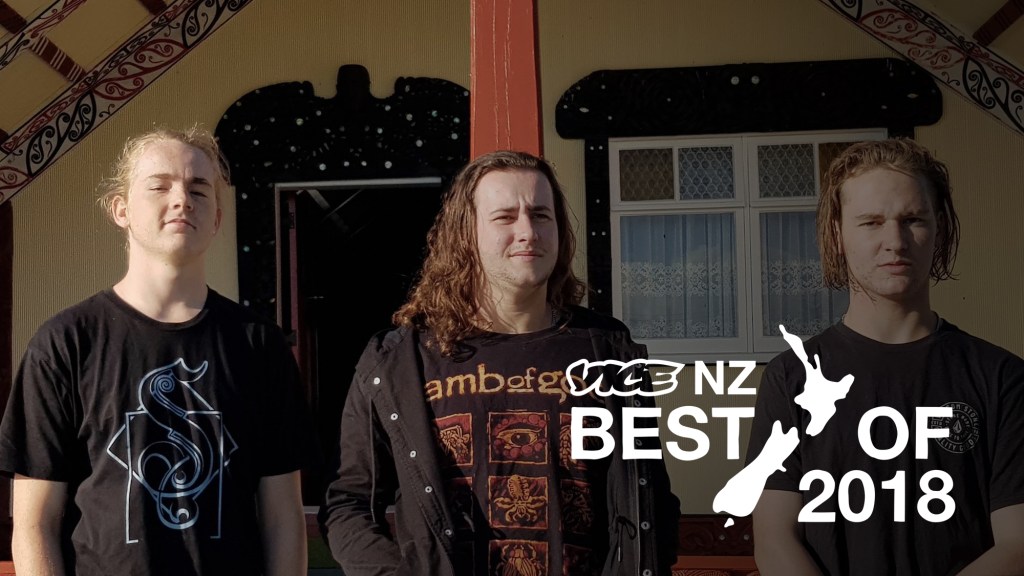Geneva Alexander-Marsters performs songs in Te Reo Māori and English in the Auckland outfit SoccerPractise. She has connections to Ngāti Kahungunu ki Wairoa, Rarotonga, Tahiti, Ireland, Scotland, Britain and France.
Heavy metal music has always been the realm of rage. Moving through all kinds of cultural landscapes, it supplies the world with a steady stream of heavy riffs, stomping rhythms and screaming vocals that belt out raw channels of emotion.
Videos by VICE
Like metal, the haka provides a space to express intense emotions. Perhaps it is part of human nature to occasionally ‘rage out’—a natural response to catastrophe, fear, or even despair. In a group, haka is a powerful source of wairua [spirit] when it comes to being enraged by deep issues. The ancient artform defines special occasions and ceremonies that are linked to our reality in the present and to our ancestors in the astral realm.
So while the pairing of thrash metal—typically the realm of long-haired white men—and Te Reo Māori by Alien Weaponry might seem incongruous, songs like ‘Raupatu’ continue the tradition of the haka, pushing it forward into a new era.
Like a traditional haka, ‘Raupatu’ channels a hyper-masculine energy which pushes through the physical, spiritual and emotional dimensions of performers. In ‘Raupatu’, the call and response between the lead vocalist and band shows the strength of their bond. The song names prominent Māori leaders who resisted the colonial government. The pounding lyrics echo the anger and strain suffered by past, present and future generations.
You take and take
But you cannot take from who we are
You cannot take our mana
You cannot take our Māoritanga
You cannot take our people
You cannot take our whakapapa
Aotearoa went through a period of erasing these histories, a common practice in colonial and post-colonial society to minimise visibility for tangata whenua and their suffering. It is a positive step to see these stories find a place here, expressing the emotion of the stories to a new community.

By comparing metal and haka, it is important to acknowledge them as separate art forms. Waiata and haka have a different set of guidelines in Te Ao Māori. Indigenous content needs to be protected in mainstream culture, especially since tourism is a growing asset to the New Zealand economy. In the past, Māori information has been absorbed and then re-calibrated incorrectly. Throughout centuries, cultural identity developed into a consumable. Pākehā culture has a long legacy of appropriation, producing watered-down anglo alternatives.
But it’s possible to avoid the pitfalls of cultural appropriation while still using Te Ao Māori in a modern context. It’s a matter of looking for what has been appropriated and acknowledging who originated it.

Today, indigenous content is on the rise and ‘Raupatu’ is only one example. These histories are important to articulate in popular culture so that they will be remembered and those who were involved are held accountable. It is also important to look ahead and create indigenous content that reflects the present.
I am part of a lost generation. I don’t have kuia or koro, my father wasn’t around much and I have never been to visit my turangawaewae. Having a Māori education from an early age was my only opportunity to engage with some part of my Māori lineage. I have learned that the risk of having an underdeveloped cultural identity can lead to low self-esteem, stunted emotional growth, disconnection and behavioural issues.
People like me belong to both sides of an ongoing struggle. I can see what needs to be improved and also have the power to contribute towards a better future. However, it takes the support of a community to truly make the difference to influence the future generations that we will eventually leave behind.
Legacies are born from the hard work of our ancestors, and it is the burden of our present generation to regain these stories so that they never disappear again.




